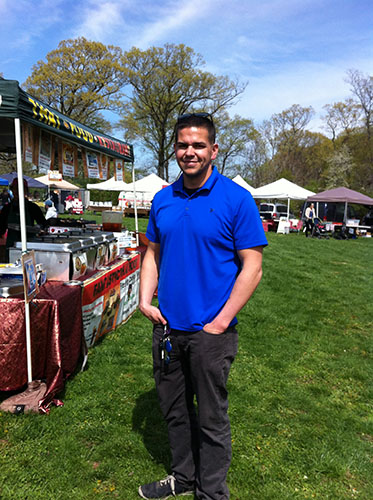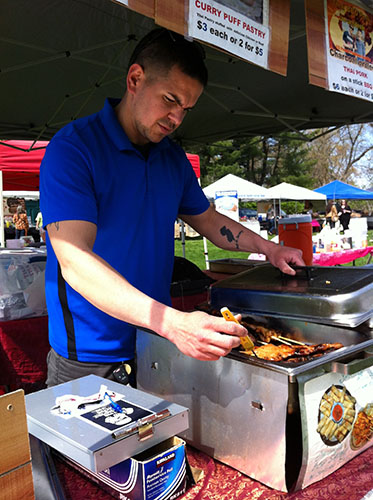Main Content
Rutgers Student Saves a Life, Then Plans a Career Dedicated to Helping Others
Written by Rebecca Rathmill; originally published in Fall 2010 and updated with new photos in May 2015
It was a hectic and wintry February day. A strong snowstorm had blown in preventing many staff from getting to work at the Woodbridge Hilton. Nickolas DeStefano, a 2007 Rutgers graduate from South Amboy, had planned ahead and spent the night there. He was tapped to help fill in for the lunch shift at the hotel’s restaurant. Despite the weather, the restaurant was busy and Nick, 26, had his hands full.

As he passed a table where a young woman sat, a scuffle caught his attention.
“I thought she had gotten sick,” he said. “My first thought was, ‘Great, now I have to clean up the mess!’”
But as he turned and made eye contact with the woman, she put her hands to her throat and he knew she was in trouble. Nick leapt into action.
He helped the woman up, stood behind her, and performed the Heimlich maneuver. Her body was so tense that even after three tries, Nick did not have success. His mind raced. He scanned the room for someone to call an ambulance. He worried about the prospect of her passing out. ‘What if I have to do this while she’s lying down?’ he asked himself. Fear crept in, too. ‘What if I can’t help her?’ The whole scene seemed to move in slow-motion and flew by at the same time. It was surreal for Nick.
Despite his anxiety, Nick kept his cool. He told the woman to calm down and relax her body. “We’re going to try this again,” he said. “I’m going to stay with you.”
His reassuring words helped. The woman relaxed a bit. Nick tried again and it worked. He heard her clear her throat and catch her breath.
When the woman – he later learned her name was Georgette – sat back down, Nick checked to make sure she was okay. Georgette seemed embarrassed by the situation but Nick was relieved. He returned to work but could barely serve drinks, his hands were shaking so badly.
As the lunch rush ended, Georgette sought Nick out to thank and hug him. “Thank God you were here,” she told him. Later she wrote a letter of thanks to the hotel’s General Manager. Nick was touched by her gratitude.
Fast forward to June: three years after graduating, Nick weighed his options and made the necessary plans to return to Rutgers to enroll in the Office of Continuing Professional Education’s Environment and Public Health program. The 8-week class is held every summer and is accompanied by a 200-hour internship at a health department. Successful graduates are eligible to take an exam to become licensed health inspectors.
It was the third week of class, and Nick was getting into a groove with the intense schedule and content. So when his manager at the Hilton, Sonia Inacio, insisted that he attend a meeting in the middle of a Tuesday afternoon, he was a bit annoyed.
He stayed as long as he could to learn about pesticide safety before he rushed out into the hot June day. He hurriedly changed his clothes in his car, from summer casual to professional, and raced to the Woodbridge Hilton.
When he arrived for the meeting, Inacio thrust a phone into his hand. On the other end were Hilton’s Recognition & Awards Coordinator, Stacy Biggs, and Vice President of Brand Culture & Internal Communications, Bob Brooks. They presented Nick with the “Spirit of the Hilton” award for his heroic act earlier this year.
Each month, hundreds of employees are nominated from around the globe for the award and only 10 employees win. “It’s a big honor because you are competing against employees worldwide,” said Hilton’s Director of Recognition & Awards, Pam Meiners. “It’s a way we can recognize our top performers.”
The nominator was none other than Georgette, the patron whose life Nick saved. Stunned and grateful, Nick accepted a plaque, a $350 check, and enjoyed a party – not a meeting – with Inacio and his co-workers.

Nick learned the Heimlich maneuver as a boy scout and also took first aid courses while a student at Rutgers, but he never had to use it in a real situation until this year. He was amazed how many people came up to him after and asked him how to do it. “Only hotel managers are required to take First Aid and CPR,” Nick said, but he has been pushing all employees involved in food service to learn. He’s even taught a dozen co-workers himself.
Nick’s desire to help others is also evident in his newly chosen career track. After finishing the Environment and Public Health class and his internship at the Middlesex County Health Department, he sat for the state exam to become a licensed Registered Environmental Health Specialist (REHS).
“I’ve always been interested in the environment and now I want to help people at the local level,” Nick said. New Jersey REHSs are the front-line investigators at health departments, doing work that ranges from investigating water pollution at the beach to ensuring safe food handling in restaurants to identifying the causes of lead poisoning in children.
When Nick called his mom the afternoon of the party to tell her the great news, the first words out of her mouth were: “Why aren’t you in class?” (Even heroes have to answer to Mom!) Once she heard the reason, Nick’s mom was very proud.
Nick admits that it was very scary to hold someone’s life in his hands. “I hope I never have to do that again,” he said. And yet he has chosen to devote his career to public health and a position that will enable him to help prevent disease, improve the environment, and save lives. Apparently, being a hero is in some people’s blood – and that’s a good thing for us all.
Learn more about Rutgers’ Environment and Public Health (EPH) Program!
Contact Olga Welsh at 848-932-7315 or eph@njaes.rutgers.edu.